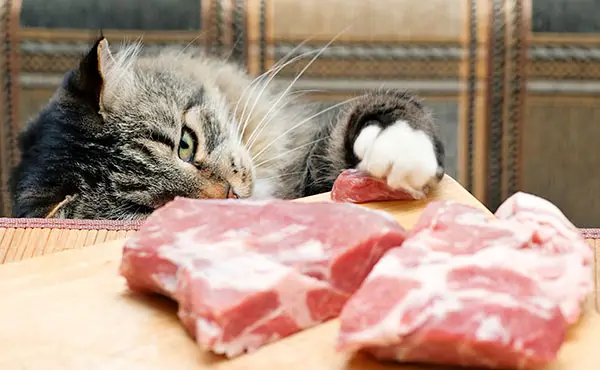Pork is one of the most popular meat forms out there. Its popularity is probably only rivaled by that of beef.
Pork also attracts approbation and prejudice in equal measure. While some people can’t go a week without gorging themselves on a pork-based diet, other cultures and religions wouldn’t be caught within several miles of a pig abattoir or butchery.
But pork doesn’t just attract cultural and religious stereotypes. Despite its delectable taste, pig meat embodies everything that humans shouldn’t eat. Indeed, there’s no shortage of medical studies citing pork for the increased cases of chronic diseases like heart disease, diabetes, obesity, arthritis, osteoporosis, and even impotence.
So, if you’ve developed a love affair with meat, it’s always prudent to consider pork alternatives.
But can the same be said about our feline friends? Can cats eat pork?
Unfortunately, the answer to that question isn’t always clear-cut. For those coming from the assumption that pork is a virus-free meat, then the answer is yes, cats can eat pork. But if you really cannot vouch for the quality and safety of pork, it’s better not to serve it to your kitto. That’s primarily because cats experience near-similar physiological processes as humans. Which means that the artery-clogging cholesterol as well as saturated fat in pig meat is likely to be more harmful than helpful to them.
So, can I feed my cat pork?
Well, as we’ve just indicated, this question cannot be answered in a definite ‘yes’ or ‘no.’ Every cat owner must first assess the quality of pork (or any other foods for that matter) before feeding it to their feline friends.
Read on as we uncover some of the potential benefits and dangers of feeding pork to cats.
Table of Contents
Health Benefits of Pork for Cats
It’s not unusual to come across a cat owner wondering, ‘is pork good for cats?’
Well, like most meat forms, pork definitely comes with plenty of minerals and vitamins that your furball can benefit from.
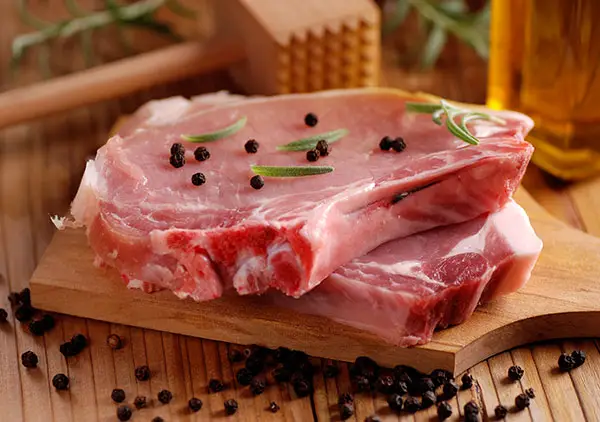
For starters, a 3.5-ounce or 100-gram serving of cooked, ground pork has the following nutritional profile;
- Carbs – 0 grams
- Fiber – 0 grams
- Sugar – 0 grams
- Fat – 20.8 grams
- Protein – 25.7 grams
- Water – 53%
- Calories – 297
In addition to these minerals, pork also contains Vitamin B1, Vitamin B6, Vitamin B12, zinc, iron, selenium, niacin, and phosphorus. Each of the above-listed minerals and vitamins play a crucial role in the health as well as growth and development of your cat.
1. Protein
Protein, which represents about 26% of lean, cooked pork, forms the building blocks of cells, tissues, organs, and muscles. In simpler terms, it’s almost impossible for cats to live without animal protein in their diets.
As a matter of fact, cats are obligate ‘true’ carnivores, which means that they can thrive exclusively on meat-based diets like pork.
Still on proteins, pig meat boasts all nine essential amino acids required for healthy growth and maintenance.
2. Vitamin B1
Also known as thiamine, Vitamin B1 is essential for glucose metabolism. The vitamin affects how your cat’s body makes and stores energy.
It’s also necessary for the growth and maintenance of the nerves, heart, and muscles.
- One (1) 14 lb. Bag - Purina Pro Plan High Protein Cat Food With Probiotics for Cats, Shredded Blend Chicken and Rice Formula
- High protein formula, with real chicken as the first ingredient. Fortified with guaranteed live probiotics to support digestive...
- Crunchy kibble and meaty, shredded pieces for a delicious mealtime experience. Used to be known as SAVOR Shredded Blend Chicken...
Last update on 2024-07-24 / Affiliate links / Images from Amazon Product Advertising API
3. Vitamin B6
Vitamin B6 plays a crucial role in the formation of red blood cells. A healthy supply of this vitamin might aid your cat’s circulation and help keep cardiovascular diseases at bay.
4. Vitamin B12
Just like Vitamin B6, Vitamin B12 also plays a role in blood formation. Other studies have also linked this vitamin with improved brain function. A deficiency in Vitamin B12 might cause anemia and neuron damage.
5. Zinc
Zinc is an essential mineral required for the maintenance of the brain and immune system.
6. Iron
Your cat’s body uses iron to make hemoglobin, a compound that aids in the transportation of oxygenated blood from the lungs to the rest of the animal’s body. That makes iron an essential mineral for blood circulation.
Iron can also enhance the functions of your cat’s gastrointestinal processes, increase metabolism and energy production, regulate the animal’s body temperature, and improve his overall immunity.
7. Selenium
Selenium is a powerful antioxidant. As such, it might help to guard against certain feline diseases, including heart disease, certain cancers, thyroid problems, and asthma. Selenium is also associated with improved mental health and overall immunity.
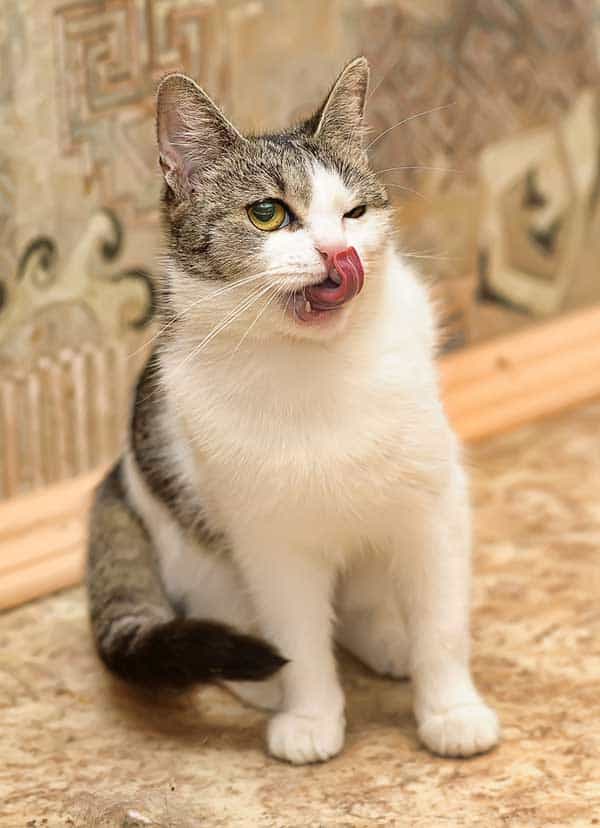
8. Niacin
Niacin has been used for more than 50 years to treat high cholesterol problems in humans. And it might be just as effective against cholesterol buildup in your cat’s body as it is in humans’.
The mineral can also lower the risks of arthritis, diabetes, and heart disease, while improving your cat’s coat and brain function.
9. Phosphorus
Phosphorus promotes strong teeth and bones. It’s also useful in the production of DNA and RNA, as well as management of how your cat’s body stores energy.
Phosphorus-rich foods like pork might also help in the growth and maintenance of cells and tissues.
Last but not least, the high water content in pig meat cannot be overlooked. As you may already know, water plays the most functions in an animal’s body. In fact, it’s one of the basic needs for survival. With more than 50% water content, pork might just be the right food to feed your cat to avoid dehydration.
Well, then, is pork ok for cats?
Based on the above-highlighted benefits of pig meat, you may be tempted to readily feed pork to your feline friend. However, the following sections shall offer more insights into some of the potential dangers of pork for cats.
- Real turkey is the number 1 ingredient in this Purina indoor cat food to help provide the protein she needs for strong muscles,...
- High protein cat food kibble with 10 percent less fat than Purina ONE Tender Selects Blend With Real Chicken helps her maintain a...
- A SmartBlend of fiber-rich nutrition in weight control dry cat food helps minimize hairballs, and four antioxidant sources support...
Last update on 2024-07-24 / Affiliate links / Images from Amazon Product Advertising API
Possible Dangers of Feeding Pork to Cats
Having just reviewed several potential health benefits of pork for cats, you could now be wondering, is it ok for cats to eat pork?
Well, anything that has advantages must certainly also have some cons. And in the case of pork, you might want to familiarize yourself with some of the meat’s potential side effects before feeding it to your kitto.
The following are some of the problems that pork might present to cats;
1. High-fat content
Many pork opponents fear the meat for its high-fat content, and those fears are well-founded. Indeed, feeding pork to your cat without taking due precautions is the surest way to set the animal up for obesity and other weight-related problems.
Fatty foods like pork are also infamous for their cholesterol-clogging properties. As such, they may increase your cat’s chances of developing heart and cardiovascular disease. Remember, cats sleep for between 16 and 20 hours a day, which leaves them with minimal time to burn off excess fat.
Of course, there might be a slight difference between raw and cooked pork fat. That begs the question, can cats eat raw pork fat? And what of cooked pork fat, can cats eat cooked pork fat? Both raw and cooked pork fat are potentially harmful to cats.
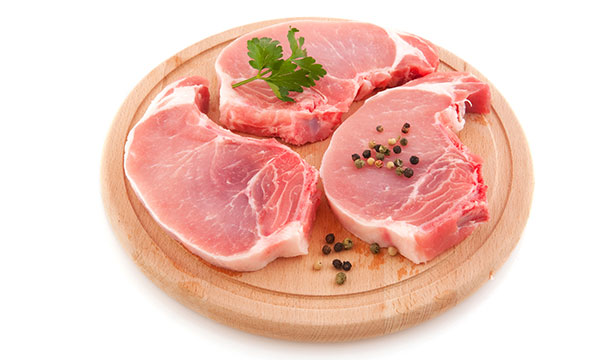
2. Hepatitis E and other harmful microorganisms
Medical researchers have established a close link between pork liver and hepatitis E. Although hepatitis E is more common in humans, our pets can also contract and transmit this virus.
Infection with the hepatitis E virus can lead to acute illness, and some of the symptoms include;
- Nausea and vomiting
- Fever
- Fatigue
- Joint and abdominal pain
- Jaundice
- Enlarged liver
- Other liver problems, such as cirrhosis and liver failure
In rare but severe cases, hepatitis E infection might lead to feline myocarditis (inflammation of a cat’s heart muscles), pancreatitis (swelling of the pancreas), and blood disorders. The infection has also been associated with musculoskeletal problems and neurological disorders. If untreated, hepatitis E might kill your cat.
But what of cooked pork liver, can cats eat cooked pork liver?
Cooking may denature bacteria and viruses in raw meat. Which means that cooked pork liver is relatively safer for cats compared to raw pork liver.
In addition to the hepatitis E virus, other common microorganisms in pork include;
✔ Taenia solium – Also known as the pork tapeworm, Taenia solium is an intestinal parasite that’s mostly contracted from eating raw or undercooked pork.
✔ Trichinella – Trichinella is a family that comprises parasitic roundworms that cause a disease known as trichinellosis or trichinosis. Symptoms include nausea and vomiting, diarrhea, stomach pain, and heartburn.
✔ Toxoplasma gondii – This is another toxic parasite that your cat might contract from eating pork.
✔ Salmonella – A bacteria that causes salmonella poisoning (a condition medically known as salmonellosis). Some of the symptoms of salmonellosis include gastrointestinal distress, dehydration, and fatigue.
Besides transmitting a host of viruses, bacteria, and parasites, pork liver may also cause vitamin A toxicity in cats.
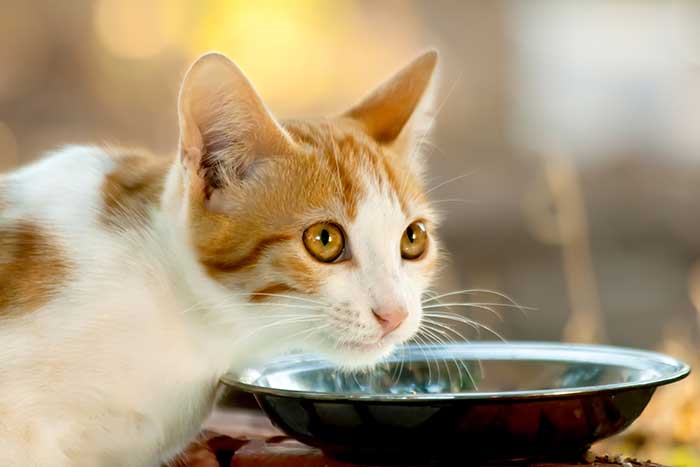
3. Calories
Pork is significantly high in calories. A high-calorie food may not be immediately harmful to your cat, provided that the animal burns more calories than he stores.
But remember that cats can sleep for up to 20 hours a day, which makes it difficult to completely dispense with pork’s high calorie count.
4. Other side effects
Besides its high fat and calorie content, as well as being infested with toxic microorganisms, pork may also present a host of other side effects depending on how you serve the meat to your cat. For instance, cooked pork shouldn’t contain too much salt or spices like onions and garlic.
Excessive salt consumption might lead to a life-threatening condition known as sodium-ion poisoning. Some of the symptoms of sodium-ion poisoning include; nausea, vomiting, diarrhea, abdominal pain, dizziness, and seizures.
On the other hand, consuming spicy foods might trigger a medical condition known as Heinz body anemia. Some of the symptoms to watch out for include nausea, vomiting, fatigue, difficulty breathing, elevated heart rate, and pale gums.
You can also not rule out the fact that your cat may develop allergic reactions to pork. Symptoms of allergy range from gastrointestinal issues like vomiting and diarrhea to respiratory complications like wheezing and difficulty breathing.
Other possible side effects of pork allergy in cats include skin itchiness, dilated pupils, and runny eyes and/or nose.
So, can cats have pork or is pork bad for cats?
Having reviewed both the pros and cons of pork for cats, you should have already determined whether this meat is suitable for your kitto or not. If you’re yet to decide, perhaps the next section will help to clear all your doubts.
- Contains Fifty (50) 0.14 oz. SHEBA Meaty Tender Sticks Salmon Flavor Cat Treats
- SHEBA Meaty Tender Sticks Treats for Cats are made with real meat for a taste adult cats love
- These irresistible cat snacks are made with no corn, wheat, soy and no artificial flavors
Last update on 2024-07-24 / Affiliate links / Images from Amazon Product Advertising API
Raw versus Cooked Pork – Which Is Better For Your Cat?
Before domestication, cats used to hunt down their prey and consume it raw. That feeding habit still exists among the domestic cat’s wild cousins such as the lions, cheetah, leopards, etc. Based on that evolutionary trait, many cat owners would readily want to feed raw pork to their feline friends.
But can cats eat raw pork?
While cats will be happy to gorge themselves on raw pork, you probably shouldn’t feed raw pork to them for the obvious reasons. As we already mentioned, raw pork may harbor certain bacteria, viruses, and parasites that could lead to acute infection.
If you must feed raw pork to your feline friend, wash the meat properly and then sear whole chunks into smaller portions to minimize bacterial contamination.
In the same breath, avoid giving your cat commercially-ground pork as the meat usually contains all the surface bacteria distributed all over it. Even worse, grinding may degrade some of the essential minerals in pork, such as taurine. Perhaps you’ve always wanted to feed ground pork to your feline friend but kept wondering, can cats eat ground pork? Well, we hope you’ve got your answer right there.
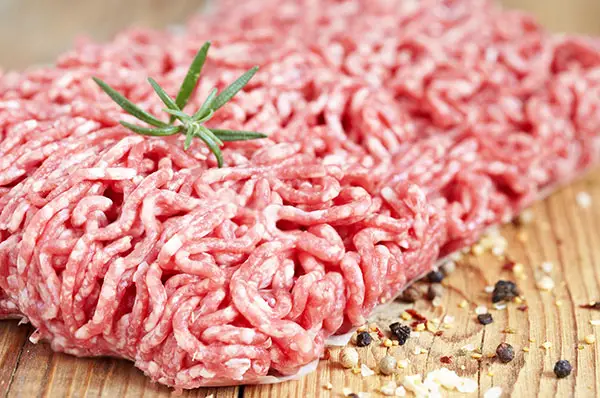
But the fact that cats shouldn’t eat ground pork may also get you wondering, can cats eat raw pork mince?
Pork mince is basically pork that’s cut into very small pieces. While it’s advisable to sear pork into smaller chunks before feeding it to your kitto, pork mince may contain way too small portions. So, just like ground pork, pork mince may carry higher risks of bacterial and parasitic contamination than pork that’s simply cut into smaller chunks. Plus, pork mince might contain up to 20% more fat than regular pork meat, which makes it all the more unsuitable for cats.
All in all, raw pork is not recommended for cats as the meat could be infested with a host of harmful microorganisms. And although washing and searing the meat into smaller chunks might reduce bacterial contamination, it doesn’t exactly make raw pork risk-free.
? But if you’re still adamant about feeding raw pork to your cat, there’s one last saving grace – freezing the meat for at least a month to kill the bacteria in it.
Can cats eat cooked pork then?
Having already highlighted some of the potential side effects of raw pork for cats, you may now be wondering, is it OK to feed the cooked pork to eat?
Yes, cooked pork is safer for cats than raw pork. That’s primarily because cooking denatures the bacteria that may be present in raw pork. However, you must avoid overcooking the meat as that could also destroy some of the essential minerals in it. Plus, overcooked pork may harbor some carcinogenic substances.
Therefore, keep the heat high enough to kill the bacteria and parasites that might have contaminated the pork, and low enough not to destroy the nutrients or introduce carcinogenic substances in the meat.
It’s also important to note that when it comes to feeding cooked pork to cats, the cooking method matters a lot.
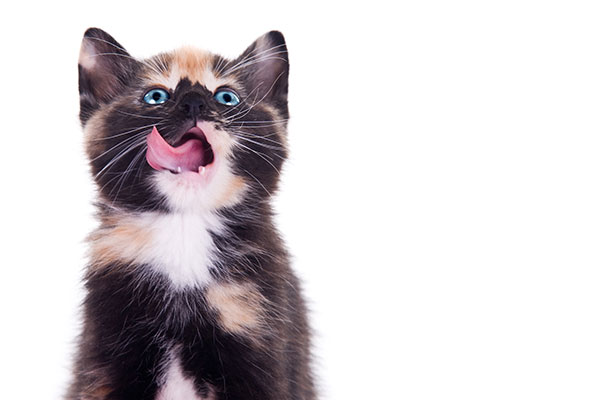
Can cats eat roasted pork? What of grilled pork, can cats eat grilled pork?
Any cooking method that involves the use of too much fat, salt, and spices is considered unhealthy for cats. Therefore, you should avoid frying, grilling, or roasting pork if you intend to feed it to your cat. The best way to cook pork for your kitto is to boil the meat in plain water.
Also, be mindful of the bones. Cooking softens the bones, thereby increasing the risks of splintering.
Maybe you’ve always wanted to feed your cat cooked pork bones but kept wondering, can cats eat pork bones?
Well, pork bones are discouraged as they could splinter during chewing, causing serious cuts and lacerations to your cat’s mouth, tongue, or digestive tract.
So, what happens if a cat eats pork?
There’s a wide range of side effects that your cat may suffer from eating pork. And as we’ve just highlighted, those side effects depend on whether the cat consumes raw or cooked pork.
Which Part Of Pork Should Cats Eat?
While highlighting some of the potential dangers of pork for cats, we already mentioned pork liver and how it could affect your kitto’s health. But pork liver isn’t the only part of pork to be wary about.
This section shall examine the health and safety of various other pork parts by answering a series of questions;
Can cats eat fried pork skins?
Pork skin is low in proteins and generally contains low nutritional value compared to other parts of pig meat. Therefore, you should probably not offer it to your cat.
Plus, pork skin is usually baked or fried, and that could introduce worrying levels of fat and salt in the meat.
Can cats eat pork rinds?
Also known as pork crackling, pork rind is simply the skin of a pig. And as we’ve just highlighted, it’s neither safe nor healthy for your cat.
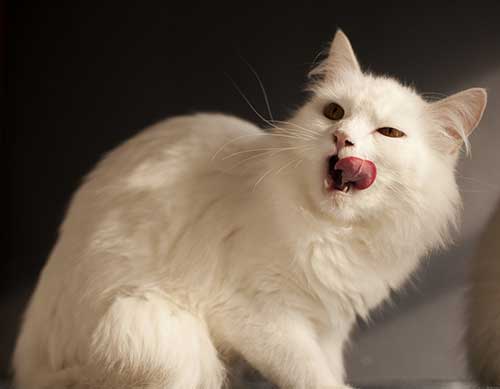
Can cats eat cooked pork tenderloin?
Pork loin and tenderloin refer to meats that are sliced from a pig’s loins. Not only is cooked pork tenderloin the tastiest part of pork, it’s also the most nutritious for cats.
But if cooked pork loin and tenderloin is safe and nutritious for cats, can cats eat raw pork loin?
Well, the idea of feeding raw pork to cats should generally be discouraged, regardless of the part of the meat you feed your kitto.
Can cats eat pork chops?
The phrase ‘pork chops’ is often used interchangeably with ‘pork tenderloin.’ It refers to pork meat that’s sliced perpendicular to a pig’s spine, which usually contains pork ribs or riblets.
Pork chops are also healthy and nutritious for cats. The only problem is that the ribs usually contain too much fat. And the fact that they’re typically made of bones might increase choking hazards.
Can cats eat pork leg and shoulder?
Pork leg and shoulder is only recommended for cats if sliced into smaller pieces. Just like pork ribs, pork legs and shoulder are typically bony and could choke your cat.
As you endeavor to establish the safety of the various pork parts for cats, you should also establish the suitability of the different pork-based products out there. Basically, the safety of any pork-derived food comes down to the individual ingredients in that product.
- Works as a dog food topper - For pet parents looking for an alternative to capsules, raw treats, or soft chews, all it takes is a...
- A tasty & body nourishing treat for cats & dogs - Essential fatty acids for a healthy coat.
- Powerful Omega Fatty Acids - This premium fish oil liquid formula is loaded with the healthy Omega-3 fatty acid (with epa and dha)...
Last update on 2024-07-24 / Affiliate links / Images from Amazon Product Advertising API
Can cats eat pork sausages?
Pork sausages are not only sumptuous, they’re also softer to chew. However, the fact that sausages are usually cured with plenty of salt and preservatives make them unideal for cats. If you must feed pork sausage to your kitto, insist on the sausage from the butcher which contains no preservatives or seasoning.
Can cats eat pork pie?
Pork pie is high in fat and the health effects of fatty foods are well-documented. So, cats shouldn’t eat pork pie.
Can cats eat pork jerky?
Pork jerky contains numerous ingredients that cats shouldn’t eat, including excess sodium and spices. Feeding pork jerky to your cat might lead to kidney damage, fluid buildup, dehydration, and a host of other unpleasant side effects.
Lastly, you might have wondered, can kittens eat pork?
Kittens shouldn’t eat pork due to their underdeveloped immune systems. If you must feed pork to kittens, keep the portions even smaller than those you would offer to adult cats. The same logic applies to other cats with suppressed immunity, such as elderly cats, sick cats, expecting cats, and cats recovering from a surgical operation.
- Love What's Simple: Made with only 1 ingredient, a whole Tuna fillet!
- All Natural, Naturally: Reveal cat treats are 100% natural.
- More, Real Protein: Give your cat what they deserve with a real protein treat.
Last update on 2024-07-24 / Affiliate links / Images from Amazon Product Advertising API
Conclusion: So, Is Pork Healthy For Cats To Eat?
Although we’ve explored numerous pros as well as cons of feeding pork to cats, you could still be wondering to yourself, can my cat eat pork?
Now, before feeding pork to your cat, it would help to weigh the potential benefits against the side effects. Most importantly, understand how to feed a cat with pork.
Basically, you should shun raw pork and insist on cooking the meat first. But note that not all cooking methods are recommended. Generally, boil the meat in plain water and avoid potentially harmful ingredients, such as fat, salt, and spices. Another best practice when trying to feed pork to cats is to opt for deboned meat and slice the meat into smaller, manageable chunks.
It’s also prudent to know the parts of pork that are considered safer, healthier, and more nutritious for cats. Above all, offer pork to your cat in moderate amounts and only as an occasional treat.
And if you’re worried about your cat experiencing any adverse effects of eating pork, there are various better alternatives to pork that you can try, such as beef, poultry, and seafood.
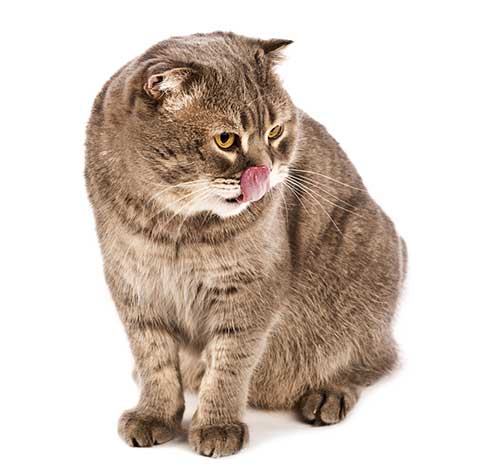
Checkout Our Favorite Cat Products
1. Best Online Course For Cat Parents
Our favorite: The Cat Language Bible (How to Finally Understand And Speak to Your Cat) – A new form of cat to human communication that many cat owners have dreamed about… but few have actually thought possible.
2. Best Vacuum to Tackle Pet Hair
Our favorite: ORFELD Cordless Vacuum – Engineered for homes with pets. With features and tools that dig out dirt, hair and allergens everywhere your pet gets.
3. Best Immune Support For Cats
Our favorite: Tomlyn Immune Support – Best Supplement for Cats and Kittens.

